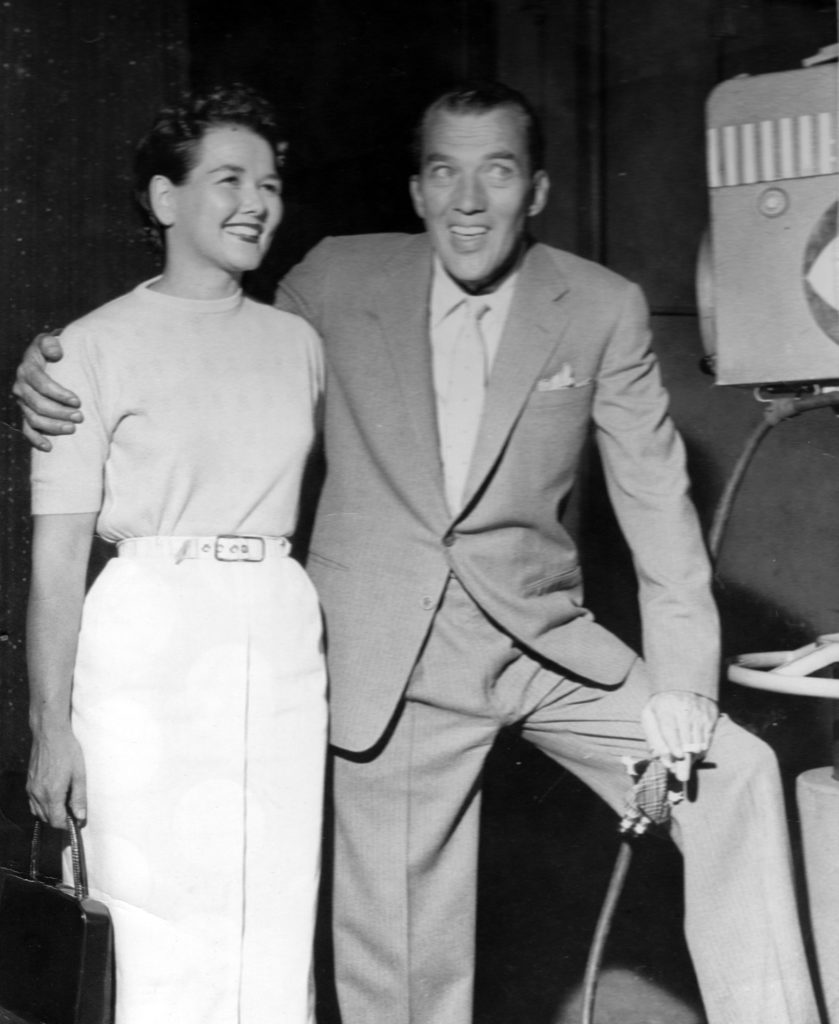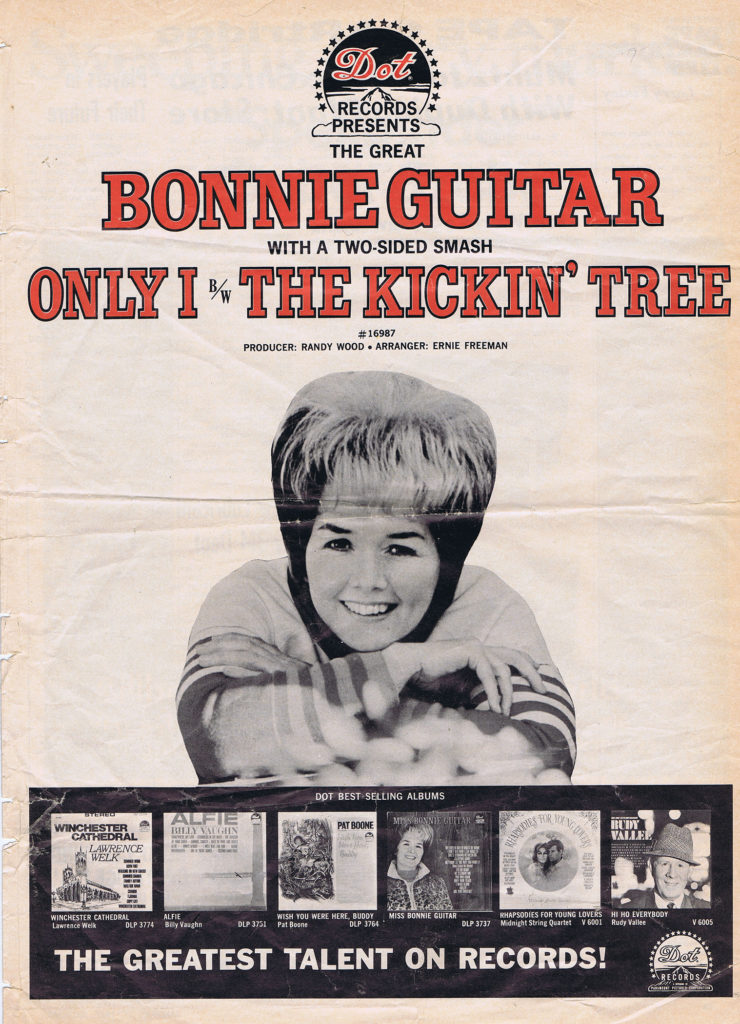The state of Washington has produced more than one star, but few whose stellar path has spanned as many decades as that of Bonnie Guitar. At age 95, Bonnie is a Washington state treasure whose career began in the late
Bonnie Buckingham was born in 1923 at Redondo Beach, Washington into a musical family. Her father and uncles were fiddlers and her brothers shared an antique flat-top Gibson guitar that Bonnie inherited when she was 13. At age 16 she won her first big talent show at the Rialto Theater in Seattle. Soon afterward, she joined a

In 1944 she married Paul Turmarc, a well-known Seattle area music teacher. Together Bonnie and Paul played many of the big roadhouses and dancehalls in the Pacific Northwest, performing music ranging from pop to Hawaiian and light jazz. They were popular guests at well-known Seattle music venues including the Eagles Nest, the Silver Dollar Tavern, and the Town & County Club.
In 1952 Herb Jeffries, a former vocalist with Duke Ellington’s

In 1955 another of her demo recordings reached producer Fabor Robison in Malibu, California. He invited Bonnie to audition and quickly offered her a contract as an in-house session musician. For the next three

In 1956 Robison was working on a recording of Ned Miller’s song, Dark Moon. He reportedly wasn’t happy with the results from the composition he recorded with rock n roll singer Dorsey Burnette. Bonnie pleaded her case for Robison to give her a chance to cut it herself. In an interview with Peter Bletcha, Bonnie made the following comments:
“I told Fabor I’d give up my royalties to be able to record that song. I knew in my mind, as little as I knew,

She did indeed give up her royalties to the song and from this deal – to the exclusive benefit of Robison – was born the most popular version of the song ever recorded. In 1957 it became an instant California hit. Shortly afterwards it broke in national pop charts and Bonnie’s career took off. She went on to appear on the Ed Sullivan Show. Then came her hit “Mister Fire Eyes” a true crossover hit followed by appearances on Dick Clark’s American Bandstand, Gene Autry’s Melody Ranch Show and the Grand Ol’ Opry.
Before long, Robison, clearly aware of Bonnie’s talent, demanded that she designate him as her personal manager under the condition that he gave him full control of all her assets. Bonnie declined and left his employment returning to Seattle.
Back home in Seattle, Bonnie’s good fortune brought her in contact with record wholesaler Bob Reisdorff whose dream was to start his own record label. With Reisdorff’s business connections and Bonnie’s production talent, they formed Dolton Records Company. Their debut production was the song, “Come Softly To Me” by the Fleetwoods, an Olympia teen do wop trio. The song was No. 2 on the Billboard charts and was soon eclipsed by the Fleetwoods next international hit, “Mr. Blue.” Bonnie found and produced songs with Northwest teen bands including the Frantics, Little Bill and the Blue Notes, Spokane’s rockabilly singer Gary Hodge, a couple of local African-American groups including the Playboys and the Four Pearls, all with releases on Dolton records. By 1960, the partnership with Reisdorff dissolved. By then Bonnie Guitar was recognized as the first successful female record producer in the country.
In 1961 she went back to Hollywood and was hired as the director of Artist and Repertoire (A&R) in the country division of RCA records. This lofty achievement for a woman in 1961 in the Hollywood music industry was unprecedented. She toured with Eddy Arnold and performed gigs with Johnny Cash, Marty Robbins, Sonny James, and Willie Nelson. In 1965 Bonnie was signed directly to Dot Records as an artist/producer, Acting Vice President, and country A&R rep for Dot’s parent company, ABC-Paramount. Her career accelerated from this point and she produced a series of hits. In 1967 she was awarded the Academy of Country Music Awards Female Vocalist of the Year and was nominated for the award several more times in subsequent years. Throughout her career she produced 13 studio albums, 7 compilation albums and 39 singles.
By the late 1960’s Bonnie had remarried and was spending more time on her ranch in Orting, Washington. Bonnie and her husband Mario DePiano raised and raced quarter horses. Bonnie continued to produce minor hits during this period.
After the death of her husband Mario in 1983, she retreated from public life. A year later, she was invited to become a regular performer at The Businessman’s Club of Notaras Lodge in Soap Lake, Washington. She accepted the offer and moved to Soap Lake. She played at the Club through 1996. Since then she has entertained family and friends with impromptu jams and interviews at her home in Soap Lake and occasionally playing concerts at nearby venues for the last 5 years. On her 91st
She recently has had a major health set back. A GoFundMe account has been established to raise funds to make it possible for Bonnie to stay at home receiving the care she needs during this precious last part of her life. The costs, estimated at $5000 per month will cover in-home care. Details of the fundraising event can be found at:
https://www.gofundme.com/bonnie-guitar
For more details on Bonnies career read Peter Blecha’s 2008 essay from interviews with Bonnie:
http://www.historylink.org/File/8656
Bonnie singing Dark Moon:




